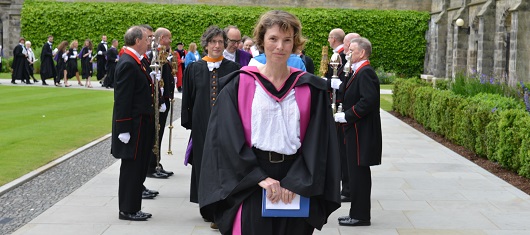Graduation Address: Professor Jane Stabler

Vice-Chancellor, ladies and gentlemen.
I offer our new graduates and their families and friends my warmest congratulations. Today is the climax of the teaching calendar and the culmination of four or five years’ work. I hope you really enjoy your graduation, together with the loyal supporters who have seen you through. The exigencies of professional and family life sometimes make it hard to be thoroughly jubilant. In the domain of sport, by contrast, celebration is never postponed or understated. All this morning’s graduates refrained from tearing off their shirts or climbing into the gallery to embrace their parents, but I trust that a proper degree of exuberance will prevail later on.
Like several working environments that have their own calendars and peculiar formalities, universities are often portrayed as somehow apart from the ‘real world’. But the challenges of facing life’s unevenness and unpredictability are common to wherever we work. I remember being surprised and gratified by the rapturous cheers of a group of American undergraduates at a summer school in Oxford when I was introduced as their tutor in English Romantic literature. How wonderful, I thought, that they are so keen to learn about the poetry of Byron, Keats and Shelley – and indeed they were; they also seemed unusually curious about where I lived in Scotland. ‘What was my house like?’ they asked, a little shyly, in the first week of the seminar. ‘Stone built, so rather draughty,’ I told them. ‘What about my garden?’ they asked, after another week had gone by. ‘A bit of a wilderness,’ I said, ‘but I’m very fond of it.’ ‘And when is it open to the public?’ they asked in the third week. At this point, it became clear that although I had been introduced to them as a Scottish Byronist, they all thought they were being tutored by a Scottish baroness. I will never forget the disappointment in their eyes. To balance out the moments of failure in one’s working life, we need to treasure and share our moments of success on occasions like today.
My work as a Byronist has given me valuable insights into the unique spirit and strengths of students at St Andrews. Firstly, your powers of resilience: Byron writes of ‘The English winter, ending in July/To recommence in August’. Although it is not on your module transcript, all the graduates here have battled their way to lectures and tutorials through at least four Scottish winters (today may or may not add to that tally).
Next, Byron was very good at responding positively to setbacks: when his first book of poems was savaged by reviewers, Byron tells us that he drank three bottles of claret and began an answer. Some of the essays I marked in the last four years suggest that several of you adopted exactly this course of action. You have all, in any case, turned any criticism you received into final essays and dissertations, which have often been a delight to read.
Despite his reputation for hectic carnality, Byron had an impressive intellect. Whatever else he was doing in Venice late in 1816, Byron studied Armenian for several hours a day at the monastery. He did this because he respected the self-discipline of mastering something difficult. You are all masters now of your chosen fields – English, Theology, Divinity, Psychology and Neuroscience. Your degrees mean that you can grapple with conceptually challenging material. Public understanding is increasingly swayed by a culture of immediacy – brash likes or dislikes, the passive consumption of trends, easy inducements. Universities are not immune from these pressures and the world needs educated, independent and adventurous minds, such as yours, for the strenuous work of thinking beyond the next contingency.
Finally – friendship, which, woven with scholarship, is the mantle you will take with you today when the graduation silks are folded back in their boxes. Byron’s domestic life was tempestuous, as domestic life often is, but his university friends lasted a lifetime.
Byron died in 1824 at the age of thirty-six. I sincerely hope that all of you enjoy much longer and equally fulfilling lives. Not many of us inherit a peerage, but we have all gained from the accident of birth that makes it possible to be educated in a relatively peaceful part of the globe. I know that you will cherish (as I do) the privilege of a world-class education in a diverse, stable, tolerant community. A mixture of luck and hard work by you and your parents or guardians brought you here in the first place and has kept us all together for the last four years. Today is a day to be grateful for the luck and to honour and celebrate the hard work.
So congratulations to all of you. Enjoy your day. Be as justly proud of yourselves as we are of you. And – as Byron would say – it has been our fortune to traverse together the fields of chivalry, history, fable and ‘the deep midnight of the mind’; I wish you many a safe and agreeable return.
Category University news